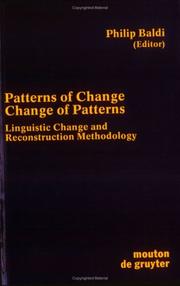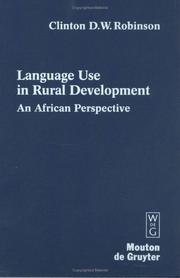| Listing 1 - 10 of 36 | << page >> |
Sort by
|
Book
ISSN: 03040720 ISBN: 9027271496 9789027271495 1299828566 9781299828568 9789027246110 9027246114 Year: 2013 Volume: v. 120 Publisher: Amsterdam John Benjamins Publishing Company
Abstract | Keywords | Export | Availability | Bookmark
 Loading...
Loading...Choose an application
- Reference Manager
- EndNote
- RefWorks (Direct export to RefWorks)
From the Renaissance onwards, European scholars began to collect and study the various languages of the Old and the New Worlds. The recognition of language diversity encouraged them to explain how differences between languages emerged, why languages kept changing, and in what language families they could be classified. The present volume brings together the papers of the late George J. Metcalf (1908-1994) that discuss the search for possible genetic language relationships, and the study of language developments and origins, in Early Modern Europe. Two general chapters, surveying the period bet
English philology. --- Linguistic change. --- Multilingualism. --- Plurilingualism --- Polyglottism --- Language and languages --- Change, Linguistic --- Language change --- Historical linguistics --- Germanic philology
Book
ISBN: 9789027246110 Year: 2013 Publisher: Amsterdam Benjamins
Abstract | Keywords | Export | Availability | Bookmark
 Loading...
Loading...Choose an application
- Reference Manager
- EndNote
- RefWorks (Direct export to RefWorks)
English philology. --- Linguistic change. --- Multilingualism. --- Philologie anglaise --- Changement linguistique --- Multilinguisme --- English philology --- Linguistic change --- Multilingualism --- Plurilingualism --- Polyglottism --- Language and languages --- Change, Linguistic --- Language change --- Historical linguistics --- Germanic philology


ISBN: 3110871890 9783110871890 3110134055 9783110134056 3111792625 Year: 2013 Publisher: Berlin Boston
Abstract | Keywords | Export | Availability | Bookmark
 Loading...
Loading...Choose an application
- Reference Manager
- EndNote
- RefWorks (Direct export to RefWorks)
Linguistic change. --- Reconstruction (Linguistics) --- Comparative linguistics. --- Comparative philology --- Philology, Comparative --- Historical linguistics --- Internal reconstruction (Linguistics) --- Protolanguages --- Change, Linguistic --- Language change --- Language and languages --- Comparative linguistics --- Linguistics change
Book
ISBN: 9783110310726 9783110313468 3110310724 3110313464 Year: 2013 Volume: 550 Publisher: Berlin De Gruyter
Abstract | Keywords | Export | Availability | Bookmark
 Loading...
Loading...Choose an application
- Reference Manager
- EndNote
- RefWorks (Direct export to RefWorks)
Die in diesem Band versammelten Beiträge wenden das aus der kontrastiven Linguistik stammende Konzept des Sprachvergleichs auf die Diachronie an. Ziel ist, dadurch Aussagen zum Sprachwandel zu treffen, die über die Einzelsprache hinausgehende Generalisierungen erlauben. Auch erscheint eine Wandelerscheinung einer bestimmten Sprache vor der Folie vergleichbarer Entwicklungen schärfer konturiert; der Ansatz ermöglicht es somit auch, das Sprachspezifische einer Entwicklung zu erkennen. Sowohl der Vergleich verwandter als auch nicht (näher) verwandter Sprachen erweist sich dabei als lohnend. Beim Vergleich nahe verwandter Sprachsysteme ist die Frage zentral, weshalb sich eine bestimmte Sprache trotz identischer Ausgangslage anders entwickelt hat als die mit ihr nahe verwandte(n) Sprache(n); beim Vergleich nicht näher miteinander verwandter Systeme stellt sich dagegen die Frage, ob Verschiedenheiten in der Entwicklung für die jeweilige Sprachfamilie spezifisch sind. Die Beiträge unternehmen Sprachwandelvergleiche für phonologische, morphologische und syntaktische Phänomene. Die untersuchten Daten stammen v.a. aus der (diachron besonders gut belegten) indogermanischen Familie, daneben werden auch seltener betrachtete Sprachen abgedeckt.
Historical linguistics --- Comparative linguistics --- Linguistic change. --- Language and language --- Grammar, Comparative and general. --- Variation. --- Language and languages --- Comparative grammar --- Grammar --- Grammar, Philosophical --- Grammar, Universal --- Philosophical grammar --- Linguistics --- Philology --- Characterology of speech --- Language diversity --- Language subsystems --- Language variation --- Linguistic diversity --- Variation in language --- Change, Linguistic --- Language change --- Grammar, Comparative --- Historical linguistics. --- comparative linguistics. --- language change. --- language contact.
Multi
ISBN: 9781107016354 9781139060998 9781107558502 1107016355 9781139625234 1139625233 1139060996 9781283986656 1283986655 9781139612210 1139612212 1107235154 9781107235151 1139608762 9781139608763 1139621513 9781139621519 1139615939 9781139615938 113961035X 1107558506 Year: 2013 Publisher: Cambridge Cambridge University Press
Abstract | Keywords | Export | Availability | Bookmark
 Loading...
Loading...Choose an application
- Reference Manager
- EndNote
- RefWorks (Direct export to RefWorks)
The chapters in this volume feature new and groundbreaking research carried out by leading scholars and promising young researchers from around the world on recent changes in the English verb phrase. Drawing on authentic corpus data, the papers consider both spoken and written English in several genres. Each contribution pays particular attention to the methodologies used for investigating short-term patterns of change in English, with detailed discussions of controversies in this area. This cutting-edge collection is essential reading for historians of the English language, syntacticians and corpus linguists.
Language change. --- Engels: syntaxis semantiek --- 802.0-56 Engels: syntaxis semantiek --- English language --- Linguistic change --- 802.0-56 --- Change, Linguistic --- Language change --- Historical linguistics --- Language and languages --- 802.0-56 Engels: syntaxis; semantiek --- Engels: syntaxis; semantiek --- Syntax --- Verb phrase --- Phrasal verb --- Predicate --- Grammar --- Linguistic change. --- Verb phrase. --- Syntax. --- Arts and Humanities --- Language & Linguistics --- Germanic languages
Book
ISBN: 9780199573745 0199573743 0191648493 1299939732 0191745243 9780191648496 9780191745249 Year: 2013 Publisher: Oxford Oxford University Press
Abstract | Keywords | Export | Availability | Bookmark
 Loading...
Loading...Choose an application
- Reference Manager
- EndNote
- RefWorks (Direct export to RefWorks)
Explanations for sound change have traditionally focused on identifying the inception of change, that is, the identification of perturbations of the speech signal, conditioned by physiological constraints on articulatory and/or auditory mechanisms, which affect the way speech sounds are analyzed by the listener. While this emphasis on identifying the nature of intrinsic variation in speech has provided important insights into the origins of widely attested cross-linguistic sound changes, the nature of phonologization - the transition from intrinsic phonetic variation to extrinsic phonological encoding - remains largely unexplored. This volume showcases the current state of the art in phonologization research, bringing together work by leading scholars in sound change research from different disciplinary and scholarly traditions. The authors investigate the progression of sound change from the perspectives of speech perception, speech production, phonology, sociolinguistics, language acquisition, psycholinguistics, computer science, statistics, and social and cognitive psychology. The book highlights the fruitfulness of collaborative efforts among phonologists and specialists from neighbouring disciplines in seeking unified theoretical explanations for the origins of sound patterns in language, as well as improved syntheses of synchronic and diachronic phonology.
Phonetics --- Phonologie --- Changement linguistique --- Grammar, Comparative and general --- Linguistic change. --- Phonology. --- Klankverschuiving. --- Phonologie. --- Change, Linguistic --- Language change --- Historical linguistics --- Language and languages --- Phonology --- Linguistics --- Philology --- Grammar, Comparative and general Phonology
Book
ISBN: 9783034314381 9783035202335 Year: 2013 Publisher: Bern Lang
Abstract | Keywords | Export | Availability | Bookmark
 Loading...
Loading...Choose an application
- Reference Manager
- EndNote
- RefWorks (Direct export to RefWorks)
Romance languages --- Historical linguistics --- Grammar --- Linguistic change. --- Historical linguistics. --- Linguistic change --- Change, Linguistic --- Language change --- Language and languages --- Diachronic linguistics --- Dynamic linguistics --- Evolutionary linguistics --- Language and history --- Linguistics --- History

ISBN: 3110146878 3110869047 9783110869040 9783110146875 Year: 2013 Volume: 70 Publisher: Berlin Boston
Abstract | Keywords | Export | Availability | Bookmark
 Loading...
Loading...Choose an application
- Reference Manager
- EndNote
- RefWorks (Direct export to RefWorks)
Communication in rural development --- Language planning --- Sociolinguistics --- Language and languages --- Planned language change --- Language and society --- Society and language --- Sociology of language --- Planning --- Social aspects --- Sociological aspects --- Rural development --- Language and culture --- Linguistics --- Sociology --- Integrational linguistics (Oxford school) --- Cameroon
Book
ISSN: 18729592 ISBN: 9789027234933 9027234930 Year: 2013 Volume: 13 Publisher: Amsterdam Benjamins
Abstract | Keywords | Export | Availability | Bookmark
 Loading...
Loading...Choose an application
- Reference Manager
- EndNote
- RefWorks (Direct export to RefWorks)
Pragmatics --- Discourse markers --- Linguistic change --- Pragmatics. --- Discourse markers. --- Linguistic change. --- Change, Linguistic --- Language change --- Historical linguistics --- Language and languages --- Discourse connectives --- Discourse particles --- Pragmatic markers --- Pragmatic particles --- Discourse analysis --- Pragmalinguistics --- General semantics --- Logic, Symbolic and mathematical --- Semantics (Philosophy) --- Philosophy
Book
ISBN: 9781441130105 9781441144652 9781441172198 9781441149664 144114465X 144117219X 144114966X 1282821989 9786612821981 1441130101 Year: 2013 Publisher: London Bloomsbury
Abstract | Keywords | Export | Availability | Bookmark
 Loading...
Loading...Choose an application
- Reference Manager
- EndNote
- RefWorks (Direct export to RefWorks)
The Continuum Companion to Historical Linguistics brings together a number of leading scholars who provide a combination of different approaches to current and new issues in historical linguistics, while supplying an exhaustive and up-to-date coverage of sub-fields traditionally regarded as central to historical linguistics research. The editors aim to build a solid background for further discussion and to indicate directions for new research on relevant open questions.
Historical linguistics --- Linguistic change --- Change, Linguistic --- Language change --- Language and languages --- Diachronic linguistics --- Dynamic linguistics --- Evolutionary linguistics --- Language and history --- Linguistics --- History --- Historical linguistics. --- Linguistic change. --- Changement linguistique --- Linguistique historique
| Listing 1 - 10 of 36 | << page >> |
Sort by
|

 Search
Search Feedback
Feedback About UniCat
About UniCat  Help
Help News
News